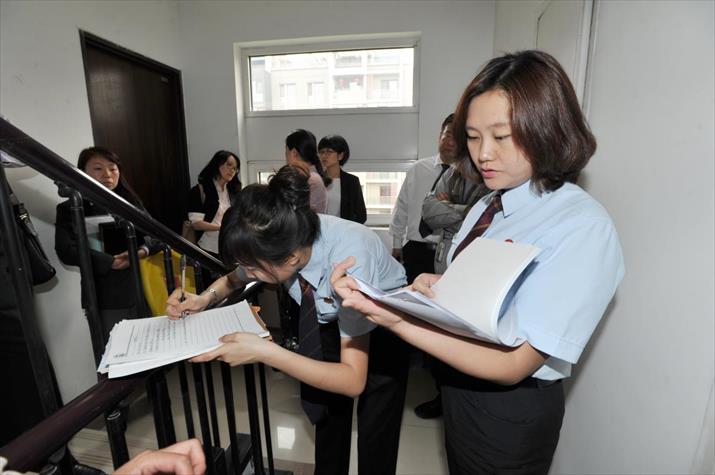 |
 |
|
| Standing by law |
| By Yuan Yuan |
 Liu Li (right) checks documents before opening a court session (COURTESY PHOTO)
At a recent exhibition held by Beijing Higher People's Court on civil cases that made pioneering steps during trials, a divorce case in 2013 that saw the issuance of the first temporary restraining order in Beijing was on display. Liu Li, the judge of the case who granted the order against a husband charged with domestic violence, is now the head of the Aoyuncun Tribunal, affiliated to Chaoyang District People's Court in Beijing. Order of protection While handling the high-profile case, the pressure was huge, Liu recalled. Kim Lee, the plaintiff, posted on her microblog pictures taken in 2011 of her bruised face and said she was beaten by her husband Li Yang, founder of Crazy English, a well-known language training school. Lee, from the United States, then sued Li for abusing her with domestic violence and requested a divorce. The involvement of a foreign litigant and a famous figure as well as the issue of domestic violence soon made media headlines, putting a lot of pressure on Liu. Liu spent much time collecting evidence and researching domestic violence. "We didn't have a law specifically on domestic violence at that time, which made the case more difficult," Liu told Beijing Review. "We also needed to keep a cool head and not be affected by media reports." After four court hearings, Liu ruled that Lee was the victim of domestic violence and granted her a restraining order against Li. "Before that, Beijing never issued a restraining order," Liu said. "We were under pressure for the possible consequences of the grant." This order is regarded as a milestone in cases of domestic violence and it also sped up the introduction of related legislation. In March 2016, China's first anti-domestic violence law came into effect. Liu contributed many suggestions in the process of the law's formulation. The complication Having graduated from law school in 2002, Liu joined Chaoyang District People's Court. Now she has dealt with more than 3,000 cases involving more than 8,000 litigants. "Beijing is a megacity with a population of more than 20 million. Chaoyang, as the most populous district in the city, always faces complicated disputes," Liu said. "Besides, it is where many foreigners stay, which makes the situation more complex." In 2008, before Beijing hosted the Summer Olympic Games, the Aoyuncun Tribunal was assigned to deal with all civil disputes involving foreign litigants in the district. "We felt great pressure due to the large workload," Liu said. "But we learned a lot in handling transnational cases." Of the 33 judicial officers in the tribunal, only 13 are qualified to hear cases. According to a statement released by the tribunal in September, it heard more than 5,000 cases in 2016 and this year, the number is expected to reach 6,000. "These disputes concern many issues including divorce and property transactions," Ouyang Hua, a colleague of Liu, told Beijing Review. A senior local woman was scared by her neighbor's dog and fell to the ground, resulting in a hip fracture. She then sued the dog's owner, a woman from South America, for financial compensation. "But when we accepted the case and tried to contact the defendant, we found she already went to Chile," Ouyang said. "This is the problem that we always come across in dealing with foreign-related cases." The case has not concluded. "We are exploring ways to deal with such cases more effectively," Liu said. Besides foreign-related cases, the number of other cases has also soared as the nation pushes forward with judicial reform. How to streamline the court hearing process and efficiently assign work is Liu's biggest challenge. Every Friday afternoon the judges gather together to discuss complicated cases and study new problems. Liu makes notes on every case she regards as typical and important, and now she has five thick notebooks. "I hope more high technology can be adopted in case hearings and we can share litigants' information through an internal system of the judicial authorities," she said. Not just about the case "A judge's duty is not just limited to being fair in trials, but extends to taking possible actions to reduce potential risks," Liu said. "This might help to save a life or a family or even change a social phenomenon. For me, this is the biggest pride of being a judge." The Aoyuncun Tribunal's jurisdiction includes some major highways and roads. In the course of handling hundreds of cases concerning traffic accidents in the area, Liu found that Laiguangying North Road is a location where many serious accidents occurred. She then did some research on the spot with colleagues. "It is a very busy road and had a large construction site. Many heavy trucks were busy rushing in and out, but the traffic signals and lights were not designed properly," Liu said. Liu made a detailed record based on the research and submitted it to the Beijing Traffic Management Bureau, which soon reacted by rearranging nearby traffic signals and assigning staff to help ease traffic along the relevant section. As a member of the Communist Party of China (CPC), Liu was elected as a delegate to the 19th CPC National Congress in Beijing in October. At the quinquennial political event, she said she will put forth proposals on advancing the rule of law in the country. |
| About Us | Contact Us | Advertise with Us | Subscribe |
| Copyright Beijing Review All rights reserved 京ICP备08005356号 京公网安备110102005860号 |